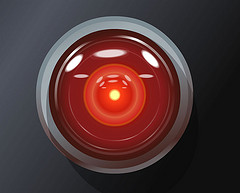Arthur C. Clarke: All These Worlds Are Yours

For every person, there are personalities who’s influence and life’s work that can shape one’s imagination and destiny. For some people, they are world leaders, musicians, poets, and philosophers. For me, the Grand Masters of Science Fiction float to the very top of that august group – and few shined ever so brightly as Arthur C. Clarke.
I clearly remember who introduced Clarke's fiction to me. It was my grandfather, Dr. Jack Perlow, a prominent orthodontist and armchair scientist and writer -- who kept old, dusty, yellowed hardcover copies of the Sci-Fi greats in his upstairs library in his home in Hillcrest, Queens, along with myriad scientific volumes from great minds like Willy Ley and others of Clarke's generation. Many of them, no doubt, on “extended loan” from the local Queens Public Library.
Click on the link below for more.
Sir Arthur C. Clarke, 1917-2008.
Arthur C. Clarke, however, was different. Even between the age of 8-10 years old when I first tried cracking the covers of such works asThe Fountains of Paradise, Childhood’s End, and Rendevous with Rama, I understood the difference between his works and the others. The other Grand Masters were pure literature of the fantastic, while Clarke was a living prophet that would see many of things he wrote about come true during his lifetime – such as telecommunications satellites, missions to the outer planets, cooperative space efforts between the US and Russia, voice recognition and biometrics, just to name a few.
Watching those predictions come true made his writings more real for me as I grew older, and the amazement of watching the technology he envisioned come to fruition continues even today – such as advancements in the manufacturing of carbon nanotubes – which could some day realize the cables of the “Space Elevator” from The Fountains of Paradise. Admittedly, Clarke didn’t invent the idea of that particular yet-to-be-realized technological wonder, but the novel brought it into the forefront aerospace zeitgeist of the late 20th Century and beyond.
But for many of us, his enduring legacy, and what set the gears turning in determining my own life’s work, is his portrayal of a certain anthropomorphized computer and the consequences of technology and automation left unchecked. The 1968 film 2001: A Space Odyssey, which was adapted from Clarke’s original 1950 short story, The Sentinel, and fleshed out into a full screenplay with director Stanley Kubrick and then novelized by Clarke, probably is what sealed the deal for me to become a technologist. Not surprisingly, due to the film’s frightening depiction of HAL 9000’s murderous schizophrenia caused by faulty programming, it also instilled paranoia about computers and technology into an entire generation of baby boomers that persists to this very day.
In the early 1980's, HAL did eventually redeem himself, saving the crew and sacrificing himself in the sequel novel and the second film, setting the stage for Personal Computing and the Internet. Computers were no longer scary – Steve Jobs and Steve Wozniak further sealed the deal by putting a fruity logo on them, and eventually a smiley face on the boot-up screen. Even H.A.L. “One step ahead of I.B.M.” could be a friend, and a tool that could be harnessed by regular people, not just pasty-faced white-collared grosgrain pocket-protected computer scientists locked in some huge room with giant humming pieces of machinery and banks of winking and blinking lights.
HAL-9000: What is going to happen?
Dave: Something wonderful.
HAL-9000: I'm afraid.
Dave: Don't be. We'll be together.
HAL-9000: Where will we be?
Dave: Where I am now.
From the 1984 Peter Hyams film 2010: The Year We Make Contact
